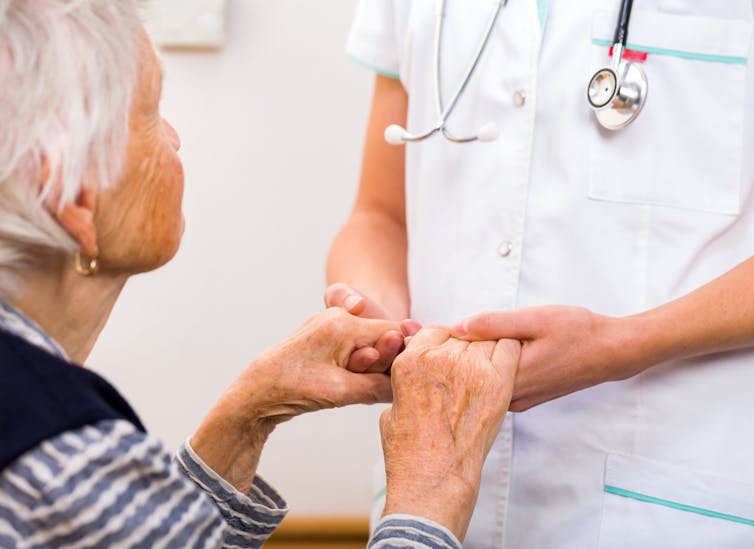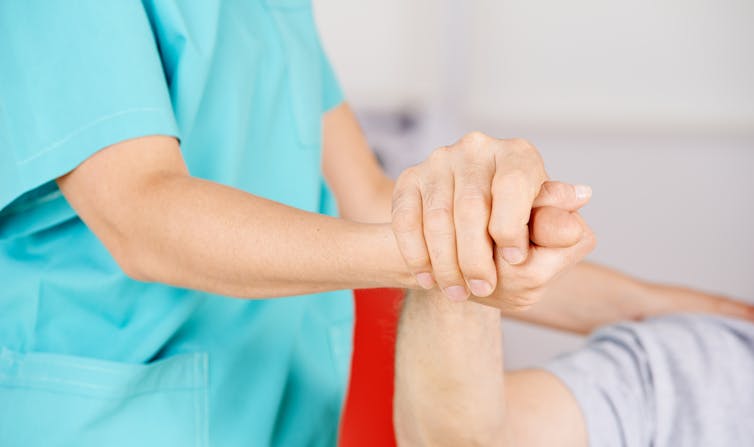How Does Pas Affect the Family of the Patient
When my mother was in her final months, suffering from a eye failure and other problems, she called me to her bedside with a pained expression. She took my paw and asked plaintively, "How do I get out of this mess?"
As a physician, I dreaded the question that might follow: Would I help her end her life by prescribing a lethal drug?
Fortunately for me, my mother tolerated her final weeks at home, with the assist of hospice nurses and occasional palliative medication. She never raised the thorny question of what is variously termed "medical help in dying" or "physician-assisted suicide."
As a son and family member who has witnessed the difficult final days of parents and loved ones, I can empathize why back up for MAID/PAS is growing among the general public. But as a medico and medical ethicist, I believe that MAID/PAS flies in the face of a 2,000-year imperative of Hippocratic medicine: "Do no harm to the patient."
Studies point out that even many doctors who actually participate in MAID/PAS remain uneasy or "conflicted" about it. In this piece, I explore their ambivalence.
Assisted suicides
In discussing end-of-life bug, both the general public and physicians themselves need to distinguish three unlike approaches.
MAID/PAS involves a physician's providing the patient with a prescription of a lethal drug that the patient could take someday to end life. In contrast, active euthanasia or "mercy killing" involves causing the death of a person, typically through a lethal injection given by a physician. Finally, the term "passive euthanasia" refers to hastening the death of a terminally ill person by removing some vital grade of support. An case would be disconnecting a respirator.
Increasing international acceptance
In the U.S. some course of legislatively approved MAID/PAS (but not agile euthanasia) is legal in five states and the District of Columbia. In my home state – following a passionate debate – the Massachusetts Medical Society recently decided to rescind its long-held opposition to the practise. MMS has taken a position of "neutral date," which information technology claims volition permit it to "serve as a medical and scientific resource … that will support shared decision making between terminally sick patients and their trusted physicians."

In a few countries, MAID/PAS has grown increasingly common. In Canada, for case, MAID/PAS was legalized in 2016. In Belgium and holland, both active euthanasia and physician-assisted suicide are permitted past law, even for patients whose illnesses may be treatable, equally with major depression; and whose informed consent may be compromised, every bit in Alzheimer's disease. In the Netherlands, a proposed "Completed Life Bill" would allow any persons age 75 or over who make up one's mind their life is "complete" to be euthanized – even if the person is otherwise healthy.
U.South. physician response
Amid U.S. physicians, MAID/PAS remains controversial, but national data point to its increasing acceptance. A study published in December 2016 plant 57 percent of doctors agreed that physician-assisted decease should be bachelor to the terminally ill – upward from 54 pct in 2014 and 46 percent in 2010.
Perhaps this tendency is not surprising. After all, what sort of md would desire to deny dying patients the option of ending their suffering and avoiding an agonizing, painful death?
But this question is misleading. Near persons requesting PAS are not actively experiencing extreme suffering or inadequate pain command. Data from the Washington and Oregon PAS programs show that almost patients cull PAS because they fear loss of dignity and control over their ain lives.
Some physicians experience conflicted
Physicians who bear out assisted suicide accept a wide variety of emotional and psychological responses. In a structured, in-depth telephone interview survey of 38 U.S. oncologists who reported participating in euthanasia or PAS, more half of the physicians received "condolement" from having carried out euthanasia or PAS.
"Comfort" was not explicitly defined, but, for instance, these physicians felt that they had helped patients end their lives in the way the patients wished. However, most a quarter of the physicians regretted their actions. Another 16 per centum reported that the emotional burden of performing euthanasia or PAS adversely affected their medical practice.
For instance, one doctor felt and then "burned out" that he moved from the urban center in which he was practicing to a small boondocks.
Other data support the ascertainment that MAID/PAS tin exist emotionally disturbing to the physician.
Kenneth R. Stevens Jr., an emeritus professor at Oregon Wellness and Science University, reported that for some physicians in Oregon, participation in PAS was very stressful. For example, in 1998, the get-go year of Oregon's "Death with Dignity Act," 14 physicians wrote prescriptions for lethal medications for the 15 patients who died from md-assisted suicide.
The country'southward annual 1998 report observed that:
"For some of these physicians, the process of participating in physician-assisted suicide exacted a large emotional toll, as reflected by such comments equally, 'Information technology was an excruciating matter to do … it made me rethink life'south priorities,' 'This was really hard on me, particularly existence there when he took the pills,' and 'This had a tremendous emotional touch.'"
Similarly, reactions among European doctors suggest that PAS and euthanasia often provoke strong negative feelings.
Why the discomfort?

As a dr. and medical ethicist, I am opposed to whatsoever form of physician assistance with a patient'southward suicide. Furthermore, I believe that the term "medical aid in dying" allows physicians to avert the harsh truth that they are helping patients impale themselves. This is also the view of the very influential American Higher of Physicians.
I believe that the ambivalence and discomfort experienced by a substantial per centum of PAS-participating physicians is directly connected to the Hippocratic Oath – arguably, the most important foundational document in medical ethics. The Oath conspicuously states:
"I volition neither give a deadly drug to everyone if asked for it, nor will I make a suggestion to this outcome."
In 5th century BC Greece, Hippocrates was something of a revolutionary in this respect. As the classicist and medical historian, Ludwig Edelstein has pointed out some non-Hippocratic physicians probably did provide poisons to their dying patients, in order to spare them protracted suffering. Hippocrates opposed this practice, though he did not believe that terminally sick patients should be exposed to unnecessary and futile medical treatment.
Palliative care specialist Ira Byock has observed that:
"From its very inception, the profession of medicine has formally prohibited its members from using their special cognition to cause death or harm to others. This was – and is – a necessary protection and then that the power of medicine is not used against vulnerable people."
Indeed, when patients nearing the terminate of life limited fears of losing command, or being deprived of dignity, empathetic and supportive counseling is chosen for – non assistance in committing suicide.
To exist sure, comprehensive palliative care, including domicile hospice nursing, should be provided to the subset of terminally ill patients who require pain relief. But every bit doc and ethicist Leon Kass has put it:
"We must intendance for the dying, not brand them dead."
Source: https://theconversation.com/how-does-assisting-with-suicide-affect-physicians-87570
0 Response to "How Does Pas Affect the Family of the Patient"
Post a Comment